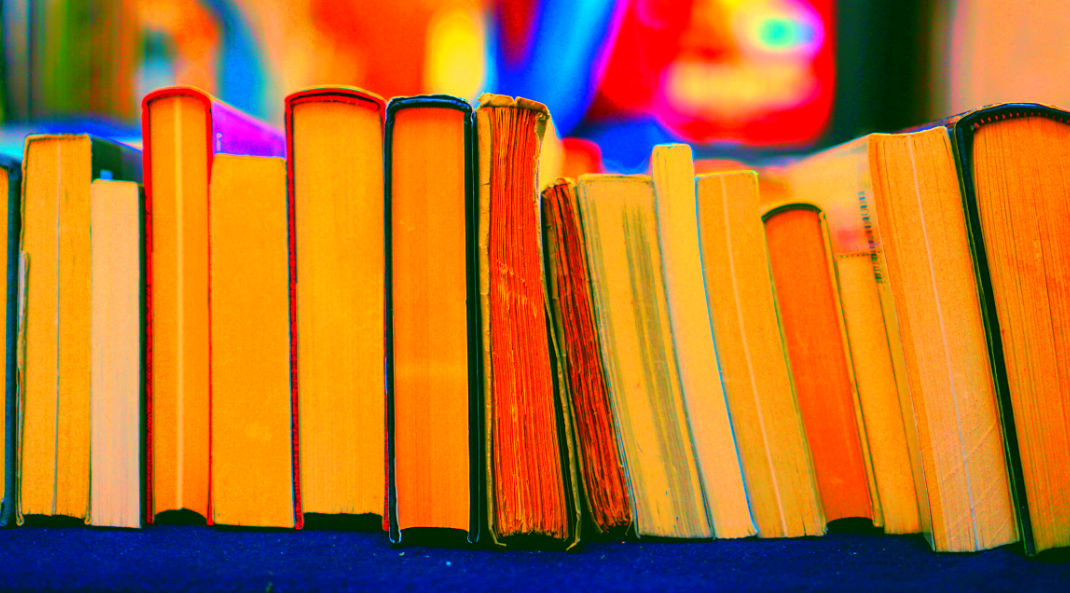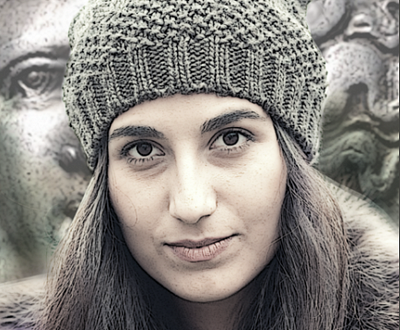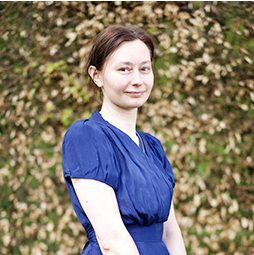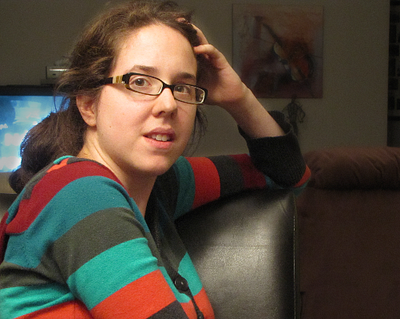
Too often, sexual and romantic relationships are presented as the most meaningful relationship you can have.
For a long time, I believed Lai — the main character in my debut YA fantasy novella, Keeper of the Dawn — had no interest in romance. She was too focused on trying to build a life that matched her ideals — to become a Keeper of the Dawn — to think about anyone else.
Somewhere along the way Lai fell in love, and I found myself writing a sweet romance between two women. But she still had no interest in sex. She didn’t feel that kind of attraction.
Keeper of the Dawn sat on my hard drive for three years between drafts, and when I finally returned to Lai’s story, I realized I also had a word for this lack of attraction: asexual.
At the time, everything I knew about asexuality came from the blog of author Amber Skye Forbes. I knew asexuality meant a lack of sexual attraction, and that many asexual people still had a sex drive and enjoyed masturbation, but that was about it.
When I returned to Keeper of the Dawn and realized Lai was asexual, I dove head first into learning more.
I found the Asexuality Archives, home of the book Asexuality: An Introductionand an extensive glossary of terms related to asexuality. I learned the difference between asexuality and aromanticism, the latter term being used to describe someone who isn’t romantically attracted to anyone. I even interviewed a series of asexual authors on my blog, The Dabbler. Those authors taught me that asexuality is a spectrum, and that the asexual community encompasses many more people than I originally imagined.
Including myself.
The realization came about when I watched Sally Le Page’s “Coming Out” video, and she used a term that had come across my radar before but never really clicked: graysexual.
According to the Asexuality Archives, a graysexual (sometimes referred to as gray-asexual) person “may infrequently experience sexual attraction, may be unsure if they have, or may experience low sexual desire, yet will generally identify as being close to asexual.”
The term immediately felt right to me. I’ve never been attracted to many people (I like to joke that it’s about 0.005% of the population), and my sex drive tapered off significantly when I hit my twenties. But, I still love sex with my fiancé, and I am attracted to enough people that “asexual” never felt right either.
Now I had a new word, one that fit me perfectly, and with that realization came a deeper understanding of my character. I can’t say for sure if Lai’s asexuality was a subconscious expression of my own identity, but I do know that it would have taken me many more years to stumble upon the term “graysexual” without researching her identity.
My story is far from unique. Most of the asexual authors I’ve interviewed had similar experiences; many believed there was something inherently wrong with them for decades before they discovered and embraced the term asexual. Asexuality is so ignored by the media it seems they don’t even know it exists.
Most people have never been exposed to anyone who explicitly identifies as asexual, not even in the fictional media they consume. At best, they’ve read the only well-known list of books featuring asexual main characters — ”Five Books With Asexual Protagonists,” at Tor.com — assumed there weren’t any more, and moved on.
But the problem isn’t a lack of asexual characters in fiction. It’s that most of those characters can be found in indie published books, and most readers, even those in the asexual community, don’t know how or where to find them.
So I gathered three of the incredible asexual #ownvoices authors who participated in my original series of interviews — Claudie Arseneault, Sophia Beaumont, and Lynn O’Connacht — and brought them to The Establishment to shed some light on all the wonderful asexual characters already waiting to be discovered.

It’s easy for people to read your bios, but your novels are much more than a series of titles. How would you describe your overall body of work?
Sophia Beaumont: I was just talking to a friend about this, and we decided that if my work had a tagline, it would be “Using rock bottom to build a foundation since 1992.”
I write about people–women, mostly–at their lowest point, and have to find some way to save themselves and often their loved ones and the world.

Lynn O’Connacht: Oooh, that is beautiful, Sophia. Stealing Sophia’s phrasing, I write about relationships, mainly, and the ways that people can (and do!) support one another.
I aim to write stories that, while they may have darkness in them, are about compassion at their core, stories that leave readers feeling good and happy. The first word I associate with my own work is “cozy.”

Claudie Arseneault: I write science fiction-fantasy stories with large queer ensemble casts and stories that lean towards politics and conspiracies. My work often centers non-romantic relationships, whether they are mentors, friends, family, or queerpatonic partners, and as a consequence, the aromantic and asexual characters often lead.

What drives you to tell these particular stories?
Claudie: A lot of the media offered to us presents really narrow definitions of what constitutes a strong, deep bond. Too often, sexual and romantic relationships take the center stage and are presented as the most meaningful relationship you can have — the one that must take precedence. I wanted something else. I wanted to explore other connections and the life-saving ways friends and families can support and care for each other, and I wanted those stories to center people like me.
Sophia: I have anxiety and depression. When I wrote my first book, I was alone in a new city in college. I felt like I should be having the time of my life, but I couldn’t. And like a lot of introverts, I looked at my fave fictional characters for answers, but none of them were like me. The hero was usually male, almost always a confident extrovert, and here I wanted to hide in the closet and give up. I didn’t have anyone to talk to or the vocabulary to express what I felt, so I wrote about it. I made a heroine who is afraid and sad and stillsaves the day.
Too often, sexual and romantic relationships take the center stage and are presented as the most meaningful relationship you can have. Click To TweetLynn: I think I started telling these stories because I really needed to read and see more of them when I was a child. Especially since in the last few years we’ve seen such a rise in grim, dark narratives. We need stories that tell different relationships, that remind us that people aren’t all bad to the core, that things can get better, that everyone can be a main character.
Do you think being self published gives you more freedom to be true to your characters’ asexual (and other queer) identities than you would at a big publisher?
Claudie: Oh, absolutely. I don’t have enough fingers to count the number of friends or fellow writers who had editors tell them friendship wasn’t strong enough to carry a book (meaning, romance was needed) or that characters uninterested in sex were boring. I don’t have to deal with that. My characters don’t need to fit into a pre-ordained format and there are no “good for marketing” checklists I need to hit. I hire editors who understand my vision and help me get there, instead of hindering it.
Lynn: I’d like to think not, but I suspect that it’s really dependent on the story in question. Some are easier to pitch than others to a traditional publisher, definitely, so being able to publish them myself or through small presses is really great. Plus, I can include representation how I want it, without worrying that I’ll have to tone it down.
I made a heroine who is afraid and sad and still saves the day. Click To TweetSophia: I do in some ways — there are a couple of books I have on the docket that I’m not even going to try to query. But for other things, I think the big 5 (the five major corporate publishing houses) have enough connections and opportunities to compensate for the freedom I’d have to give up.
I love books with a good strong friendship. One of the books I’m shopping around now really emphasizes that. The main character isn’t aromantic (aro) or asexual (ace), but she just lost her husband on page one. I had an editor flat out tell me it wouldn’t sell because it’s historical fiction without a romance. That is a book that I really want with a mainstream publisher, because I think it would do really well, but I may end up self publishing it.
Claudie: This is so infuriating. We absolutely need these stories to hit the mainstream, too.
Self publishing is still the most welcoming option for queer stories, but we’re starting to see a lot more queer identities in mainstream fiction, as well. Have you noticed this shift affecting asexual representation in mainstream publishing?
Sophia: I’ve been seeing a lot more rep in general in YA and middle grade books, but I feel like in adult fiction it’s still very lacking. It’s still seen as necessary or normal that if you’re an adult, you’re supposed to be in a sexual relationship.
Claudie: Sophia, I think in adult fiction, it is still very confined to indie books, whereas traditional YA fiction is already putting out canon asexual characters.
Sophia: I feel like one of the reasons it’s more accepted in YA is because it falls under “Oh, you’re experimenting and learning about your sexuality. You’ll grow out of it, eventually.”
And that idea is rooted in the ageist belief that teenagers can’t truly know what they want, which is incredibly harmful. Lynn, any thoughts on recent shifts in mainstream asexual representation?
Lynn: If by “shift” you mean “exist at all,” then yes. I’ve seen it shift. I have mixed feelings about it, because much of what I read seems to be by allosexuals (i.e. not on the asexual spectrum) and they don’t really acknowledge that there’s a lot of ace representation in indie publications. I really hate the sense that this handful of (mainstream) books is the only representation asexual readers have because it’s. Not. True.
(Fair warning: I have a LOT of feels about the way traditionally published authors speaking about ace representation just…ignore or erase our existence.)
I’d love to hear a bit more about your feelings on that, Lynn. How do you think that misrepresentation damages the indie community, and how can we challenge those perceptions?
Lynn: I think that the way it damages indie communities isn’t that different from how any ignoring of indie authors damages us. What it does damage, badly, is the asexual community, because it keeps asexual readers from finding representation they sorely need. I have yet to see a mainstream “ace fiction recommendations” list that doesn’t contain some variant of “This handful is all that’s out there!” when a five-minute google search will net you 20 times the number of books.
But because there’s such a strong sense of “This is all there is,” I imagine that a lot of asexual readers take that at face value and don’t run their own searches.
I’ve definitely seen those lists proclaiming “these are the few books with asexual rep,” but when I put out a call for #ownvoices authors to interview I spoke with dozens of indie authors publishing books with asexual characters. And it’s clear that the asexual community (especially in the Twitter space) is starved for this representation, but there’s a scarcity mindset that keeps them from finding the right authors.
Let’s see if we can break that scarcity mindset. Who are some indie authors you’d like to give a shout out to, and how can readers support them?
Sophia: Confession: I am really bad about reading indie books. I get most of mine from the library, and our library system won’t stock indies. But I should probably give a shout out to my partner in crime, Missouri Dalton, since our books are set in the same world.
And the best way to support indie authors is by spreading the word! I know a lot of indie authors through Twitter and have great relationships with them (they all have books on my TBR — To Be Read — list!). But I know for me, with only one book and some short stories out, it’s really hard to connect with readers.
Claudie: First I’d like to mention Shira Glassman, who writes the Mangoverse — delightful queer Jewish fantasy — and now self-publishes. Next is Kiran Oliver, who wrote Daybreak Rising, which was set to release two weeks after Torquere Publishing went under. He quickly turned around and released it.
Kiran is part of the Kraken Collective, which is a tiny group of indie queer science fiction/fantasy writers Lynn and I both belong to. The others are RoAnna Sylver, B R Sanders, and Lyssa Chiavari. All three are absolutely amazing.
Lynn: Becca Lusher. Becca is a dear friend of mine who writes epic fantasy and historical romance. She’s up there with the best authors I’ve ever read.
A.M. Blaushild is an up-and-coming author. I had the pleasure of working on their latest release, Good Angel, which is a lot of fun and has an ace-spectrum character questioning where exactly she fits. It’s a kind of rep I’ve never seen before and I really, really liked it.
Do you think readers can play a role in pushing larger book blogs and/or magazines to review more indie authors?
Claudie: Yes. Indies that really take off can get traditional book deals and even movie deals. Honestly, the best marketing indies have are their fans. When these fans start recommending indies to book bloggers, requesting them at the library, talking about it to others, that’s when the magic happens.
Sophia: Ask and ye shall receive. Usually just leaving a comment is enough. I actually watch Booktube (YouTube for book reviewers) more than I read book blogs, and they’re usually happy to respond to comments like “Have you read X? What did you think of it?” Some of them also have request forms or do Q&As.
All right. Final question! We’ve already spoken about how people can find and support indie authors in general, but how can they find and support YOU?
Claudie: I am on Twitter @ClH2OArs, and my website is claudiearseneault.com! I would highly encourage people to keep an eye on the Kraken Collective, on Twitter @KrakenColl, and with a newsletter here.
Lynn: All of my books are on Amazon and various other retailer websites. I’m also on Patreon and mirror the public posts to my blog a month later. And, of course, I’m on Twitter @lynnoconnacht.
Sophia: All of my books are on Amazon, and I’ve also got a Wattpad where they can find free reads. The next Evie Cappelli book is coming out next month, and they can find more info on that on my blog. That’s where all of the latest news goes. I can also be found on Twitter and Instagram as @knotmagick.
Want even more asexual fiction? Check out these resources:
Aromantic and Asexual Speculative Fiction Database (maintained by Claudie Arseneault) –

